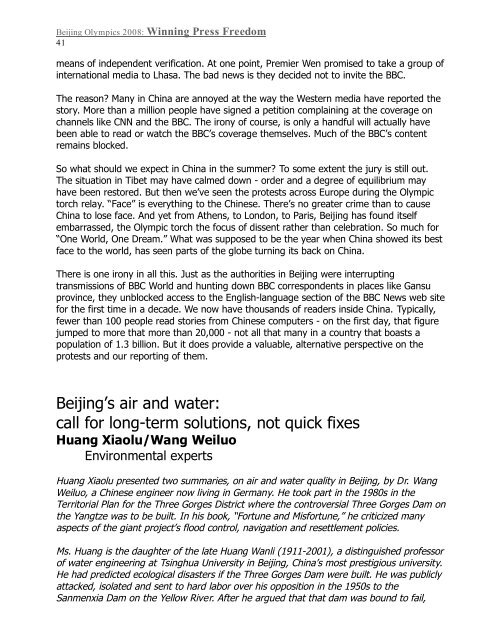Beijing Olympics 2008: Winning Press Freedom - World Press ...
Beijing Olympics 2008: Winning Press Freedom - World Press ...
Beijing Olympics 2008: Winning Press Freedom - World Press ...
Create successful ePaper yourself
Turn your PDF publications into a flip-book with our unique Google optimized e-Paper software.
<strong>Beijing</strong> <strong>Olympics</strong> <strong>2008</strong>: <strong>Winning</strong> <strong>Press</strong> <strong>Freedom</strong><br />
41<br />
means of independent verification. At one point, Premier Wen promised to take a group of<br />
international media to Lhasa. The bad news is they decided not to invite the BBC.<br />
The reason? Many in China are annoyed at the way the Western media have reported the<br />
story. More than a million people have signed a petition complaining at the coverage on<br />
channels like CNN and the BBC. The irony of course, is only a handful will actually have<br />
been able to read or watch the BBC’s coverage themselves. Much of the BBC’s content<br />
remains blocked.<br />
So what should we expect in China in the summer? To some extent the jury is still out.<br />
The situation in Tibet may have calmed down - order and a degree of equilibrium may<br />
have been restored. But then we’ve seen the protests across Europe during the Olympic<br />
torch relay. “Face” is everything to the Chinese. There’s no greater crime than to cause<br />
China to lose face. And yet from Athens, to London, to Paris, <strong>Beijing</strong> has found itself<br />
embarrassed, the Olympic torch the focus of dissent rather than celebration. So much for<br />
“One <strong>World</strong>, One Dream.” What was supposed to be the year when China showed its best<br />
face to the world, has seen parts of the globe turning its back on China.<br />
There is one irony in all this. Just as the authorities in <strong>Beijing</strong> were interrupting<br />
transmissions of BBC <strong>World</strong> and hunting down BBC correspondents in places like Gansu<br />
province, they unblocked access to the English-language section of the BBC News web site<br />
for the first time in a decade. We now have thousands of readers inside China. Typically,<br />
fewer than 100 people read stories from Chinese computers - on the first day, that figure<br />
jumped to more that more than 20,000 - not all that many in a country that boasts a<br />
population of 1.3 billion. But it does provide a valuable, alternative perspective on the<br />
protests and our reporting of them.<br />
<strong>Beijing</strong>’s air and water:<br />
call for long-term solutions, not quick fixes<br />
Huang Xiaolu/Wang Weiluo<br />
Environmental experts<br />
Huang Xiaolu presented two summaries, on air and water quality in <strong>Beijing</strong>, by Dr. Wang<br />
Weiluo, a Chinese engineer now living in Germany. He took part in the 1980s in the<br />
Territorial Plan for the Three Gorges District where the controversial Three Gorges Dam on<br />
the Yangtze was to be built. In his book, “Fortune and Misfortune,” he criticized many<br />
aspects of the giant project’s flood control, navigation and resettlement policies.<br />
Ms. Huang is the daughter of the late Huang Wanli (1911-2001), a distinguished professor<br />
of water engineering at Tsinghua University in <strong>Beijing</strong>, China’s most prestigious university.<br />
He had predicted ecological disasters if the Three Gorges Dam were built. He was publicly<br />
attacked, isolated and sent to hard labor over his opposition in the 1950s to the<br />
Sanmenxia Dam on the Yellow River. After he argued that that dam was bound to fail,





